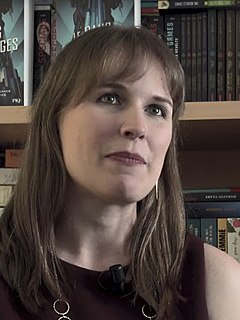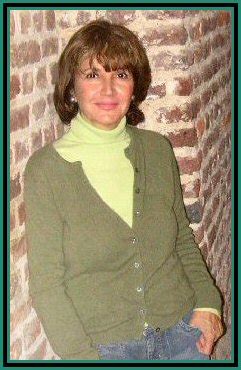A Quote by Nathaniel Hawthorne
It [the scarlet letter] had the effect of a spell, taking her out of the ordinary relations with humanity, and enclosing her in a sphere by herself.
Related Quotes
She had wandered, without rule or guidance, into a moral wilderness... Her intellect and heart had their home, as it were, in desert places, where she roamed as freely as the wild Indian in his woods... The scarlet letter was her passport into regions where other women dared not tread. Shame, Despair, Solitude! These had been her teachers—stern and wild ones—and they had made her strong, but taught her much amiss.
I found her lying on her stomach, her hind legs stretched out straight, and her front feet folded back under her chest. She had laid her head on his grave. I saw the trail where she had dragged herself through the leaves. The way she lay there, I thought she was alive. I called her name. She made no movement. With the last ounce of strength in her body, she had dragged herself to the grave of Old Dan.
Aria: I went to Hollis. Because I was looking for...you know. Her. She was teaching an art class, so I ran inside, grabbed a paintbrush, and painted a scarlet A across her chest. You know, like that woman in The Scarlet Letter? It was awesome. She didn't know what hit her. And then I said, 'Now everyone will know what you've done'. Ella: Do you realize that Hester Prynne is supposed to be a sympathetic character?
To him she seemed so beautiful, so seductive, so different from ordinary people, that he could not understand why no one was as disturbed as he by the clicking of her heels on the paving stones, why no one else's heart was wild with the breeze stirred by the sighs of her veils, why everyone did not go mad with the movements of her braid, the flight of her hands, the gold of her laughter. He had not missed a single one of her gestures, not one of the indications of her character, but he did not dare approach her for fear of destroying the spell.
Had it taken her this long to discover that she lacked some simple mental trick that everyone else had, a mechanism so ordinary that no one ever mentioned it, an immediate sensual connection to people and events, and to her own needs and desires? All these years she had lived in isolation within herself and, strangely, from herself, never wanting or daring to look back.
My God", he whispered. What have I done to her? He thought, humbled. The spell was broken, but it wasn't sealed, and her soul was bare to him, the scars of her tragic past and her triumphs over pain and her aching need to find her place. He just wanted to hold her to him and tell her it would be okay, that she had survived and was beautiful.
The extraordinary woman depends on the ordinary woman. It is only when we know what were the conditions of the average woman's life - the number of children, whether she had money of her own, if she had a room to herself, whether she had help bringing up her family, if she had servants, whether part of the housework was her task - it is only when we can measure the way of life and experience made possible to the ordinary woman that we can account for the success or failure of the extraordinary woman as a writer.
Yet there were times when he did love her with all the kindness she demanded, and how was she to know what were those times? Alone she raged against his cheerfulness and put herself at the mercy of her own love and longed to be free of it because it made her less than he and dependent on him. But how could she be free of chains she had put upon herself? Her soul was all tempest. The dreams she had once had of her life were dead. She was in prison in the house. And yet who was her jailer except herself?
What parts had she discarded for the sake of her sanity? What had she cut from herself? Had he stared into her pupils he would have emerged, bewildered and blinking, on the far side of the earth. Was he awed by her? Absolutely. Did he respect her? Unequivocally. Want to be anything like her? No, never, not at all.
Perhaps I will die too, she told herself, and the thought did not seem so terrible to her. If she flung herself from the window, she could put an end to her suffering, and in the years to come the singers would write songs of her grief. Her body would lie on the stones below, broken and innocent, shaming all those who had betrayed her. Sansa went so far as to cross the bedchamber and throw open the shutters ... but then her courage left her, and she ran back to her bed, sobbing.
A sickening howl stopped her, sucking the air out of her lungs. The night's chatter silenced, even the loitering city rats pausing to listen. Scarlet had heard wild wolves before, prowling the countryside in search of easy prey on the farms. But never had a wolf's howl send a chill down her spine like that.
Everything he'd done with regard to her in the last three years had been calculated to foreclose the intensely personal sort of talks they'd had when he was younger: to get her to shut up, to train her to contain herself, to make her stop pestering him with her overfull heart and her uncensored self. And now that the training was complete and she was obediently trivial with him, he felt bereft of her and wanted to undo it.





































